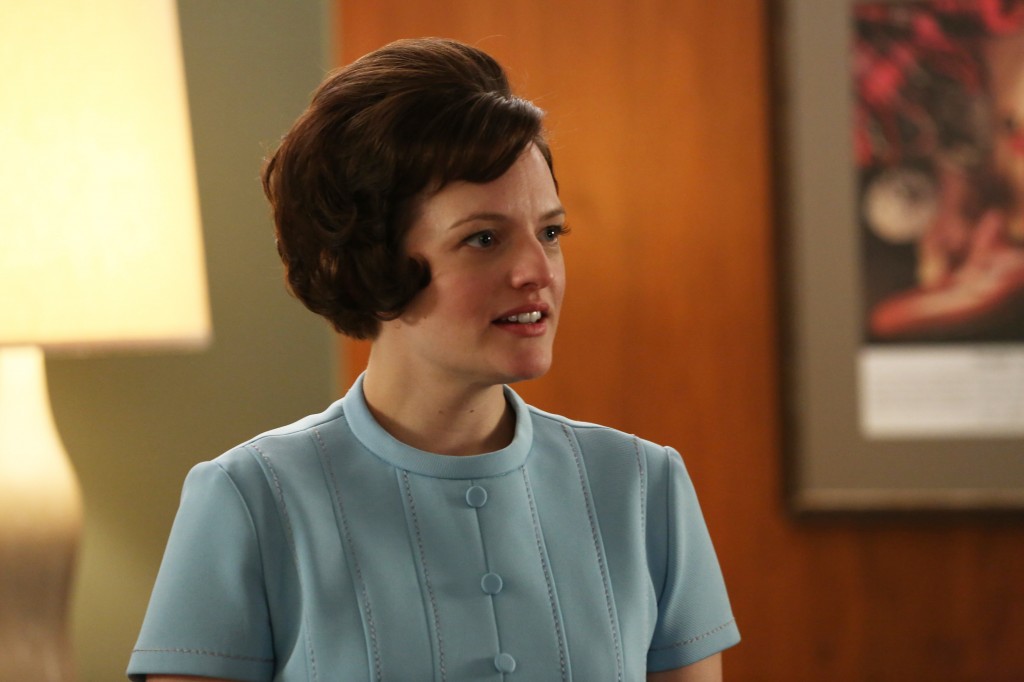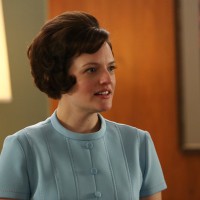
This was one of those Mad Men episodes where so much happened that I got angry when the stream I was watching cut out. Which is saying, well, something for an episode that comes after the one where MLK dies. The only history we are really dealing with this week is the history of these characters letting business get personal. We begin with a plan thwarted by the impulses and emotions of hypocritical men; prime Mad Men material, in other words. Bert, Pete, and Joan are hovering over a banker who will help the company go public at 11 dollars a share, making every partner a millionaire at the very least. This isn’t meant to be, at least not the way they think it is. Two big clients pull their business in the course of this episode: Jaguar bails because Don can’t stand Herb ordering him to listen to creative input from some kid on a Jersey car lot, and Vicks Chemical dumps Pete because his father-in-law catches him at a midtown whorehouse. Never mind the hypocrisy on the other side. Herb is unctuous and Pete’s father-in-law doesn’t seem to realize he’s guilty too, but the focus here is on Don and Pete, living up to others’ expectations of their characters. The former acts bigger than his britches, and the latter gets caught with his pants around his ankles.
Roger, also true to form, is sleeping with a stewardess with the expectation of something in return: she’ll let him know when there’s an executive waiting to be chatted up before he boards her airline. This is how Roger meets a Chevy executive nervous about the ad campaign for their latest model (the Mustang!), and this is how Roger gets the company in the door for a presentation. “I close,” he says triumphantly to Pete, basking in his return to an older glory.
If the men are living up to their expectations, the women are confounding theirs. Megan bemoans the distance she feels growing between her and Don, and her mother suggests it’s because she’s not doing what is expected of her — namely to make Don think about nothing but getting her up against a wall. When they finally do have sex, Don is more likely turned on by the fact that he gambled on other people’s fortunes by telling Jaguar to fuck off, but she thinks she has something to do with it and persists in playing the sex kitten role. It’s…uncomfortable.
Don’s impulsiveness is not as satisfying for others. When she hears that Don fired Jaguar over a creative tiff, Joan is furious and refuses to act happy. “Just once I would like to hear you say ‘we,'” she spits before storming off to her office. Unfortunately for Joan, he says “we” later, but not meaning her or the other partners. Don’s Tarzan, as Pete says; he means another vine entirely. He acts like he has a plan and has thought through the consequences of his actions, but he doesn’t and he hasn’t. He doesn’t believe in fate, he says to his neighbor, but surely he must believe in luck, because he has a lot of it. “This is why everyone hates you,” Ted says in Detroit when the two are drinking their sorrow in a hotel bar.
It’s disappointing to see Megan or Joan relegated to getting down on their knees or throwing up their hands, but I guess that’s why Peggy Olson exists, as she is the one woman who gets some rewards, albeit not totally fulfilling ones. What does she want anyway? She wanted a huge apartment of her own, and, at Abe’s paternalistic confession that he wants to raise kids in a diverse neighborhood, she compromised and bought a place in the changing Upper West Side. Surprise: she hates it. Loud music, kids on the stoop, junkies pooping in the stairwell — don’t push her, she’s close to the edge.
If there’s any consistency in Peggy’s character this season, it’s her surprise at her emotional reactions. When a bereft Ted, dismayed over his partner’s recent cancer prognosis, kisses her late at night in the office (Jesus, this episode), she is disappointed that it doesn’t go further and fantasizes about it later. (A gentlemanly Ted reading Emerson in bed, while maybe a step up from Abe reading The New Yorker in his briefs, made me laugh out loud. Maybe it’s his goofy grin? Peggy has weird ideas about what’s sexy, but whatever.) When Ted and Don decide in an all-too-familiar move to merge their companies (does Matt Weiner know of any other plot device?) and land the Chevy account with twice the manpower, Peggy’s reaction to the news is delayed hyperventilation. Yes, she will be copy chief at a top 25 agency before she’s 30 (“I’m jealous,” Ted says not so coolly), but she will also have to work with Don again, side by side with Ted. She is now getting what she hypothetically wanted: Don’s old job, respect from men she admires (or lusts after). But as Ted says in a different context, it’s one thing to want something, and it’s another to need it.
Is the line between the two ever clear? You can make someone think they want something — tease them with ads and then finally show them the product a week later, like Don’s idea (or Ginsberg’s, more likely) for the Mustang. But people decide they need something. All you can do is put them in the position to make that decision. As Don says to Ted when they’re planning their merger, you have to make the client think that it’s their idea, that it’s a necessity. If you target the right customer, that need turns into an impulse that gets acted upon, an immediate release. Peggy has to wait before she registers her shock at anything unexpected that happens, but Don can throw a fit and storm out of a restaurant whenever he wants. Fulfilled desire is still a privilege, regardless of what’s being sold as the changing times. “Make it sound like the company you’d want to work for,” Don instructs Peggy before she writes the press release announcing the merger. The irony there is that Peggy will never be at a company she wants to work for. It seems as if she’ll always be in a position of needing other people. She says she doesn’t like change and she wants everything to stay the same, but is that really true? Now she has what she wished for: she’s back at the will of Don’s impulses, needing him to make the right decisions.
What else? There were also glimpses of spare copies of Sterling’s Gold in Roger’s carry-on bag; Pete falling down the stairs like a goon; Roger using his mother’s death to get another kiss from his stewardess girlfriend; Don saying he likes puppies in an effort to appease Herb’s idiot wife; Pete saying he saw his father-in-law with the “biggest, blackest prostitute” (Vincent Kartheiser really nailed that line); Ken telling a story about seeing his high school science teacher at a porno; and, oh, Trudy finally telling Pete to pack his things because he didn’t have the character to keep her dad’s secret about that whorehouse. What a low-life. See? They really saved all the plot for this one. Here’s hoping for another episode with as much going on next week.
Follow Vol. 1 Brooklyn on Twitter, Facebook, Google +, our Tumblr, and sign up for our mailing list.


2 comments
Dunce. The Mustang is a Ford, not a Chevy.
The car he’s worried about turns out to be the Chevy Vega.